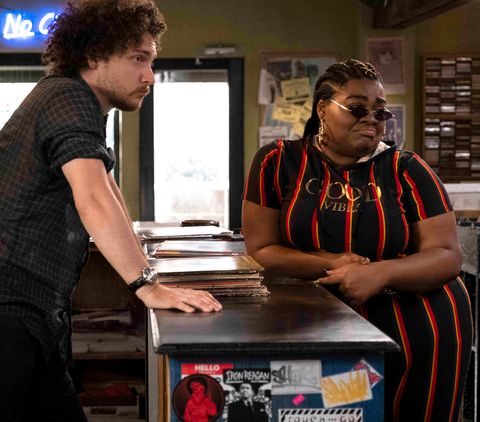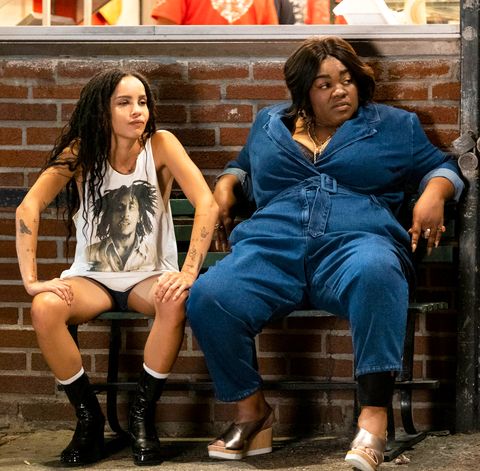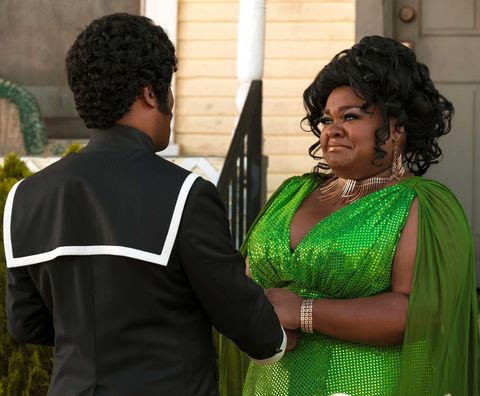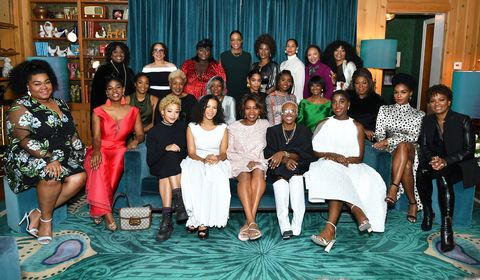If Da’Vine Joy Randolph hasn’t captured your heart and imagination yet, you better get ready—this is her moment. Last year, the actress and singer stole scenes left, right, and center in Netflix’s Dolemite Is My Name, matching wits with career-best performances from Eddie Murphy and Wesley Snipes. As Lady Reed, a woman who finds her voice and self-confidence while starring in a makeshift Blaxploitation film, Randolph is arguably the heart of the film, and critics and audiences took notice. Of course, though Dolemite is her most prominent film role to date, that kind of reaction is nothing new for Randolph. She made her Broadway debut in 2012 as Oda Mae Brown in Ghost: The Musical, a role that earned Whoopi Goldberg an Oscar for the film version. Randolph says Oda Mae required her to be “at a 12 out of 10” for every performance, which she ably delivered, picking up a Tony nomination along the way.
Now she’s taking on the small screen as Cherise, an outspoken, wildly funny music aficionado and aspiring artist, in Hulu’s High Fidelity. Based on the Nick Hornby novel and John Cusack movie of the same name, the series follows the romantic misadventures of record store owner and list-making obsessive Rob, played by Zoe Kravitz. Randolph takes on a version of the role played in the original movie by Jack Black, once again showcasing her versatility and an innate ability to make you fall in love with her characters. You will be hard-pressed to find anyone as appealing as Cherise anywhere else on television. But it seems we should expect nothing less from Randolph, who spoke with ELLE.com about creating the part, connecting with her audiences through music, and her sense of responsibility to her characters.
I was really delighted to find that this is another part for which you get to sing.
We went back and forth with “Can [Cherise] sing? Is she that kind of artist? Is it that she’s a guitarist?” We decided we definitely want her to [sing], which is interesting because she’s probably one of the most passionate, and at times combative, people. But it’s because she is trying to identify and understand who she is as a human being, as an artist. With her having such an eclectic taste, it’s like a double-edged sword—a blessing and a curse, if you will.
Cherise’s passion and the breadth of her musical knowledge can be the things that push people away and also the things that draw viewers in.
All the different rock bands and genres, that’s her schooling. You know I’m a musician; we know that feeling [that music gives you]. For example, Shalamar’s “A Night to Remember”: when we first hear the chorus and the guy comes in on the second verse, every time, my whole insides swell with happiness. And I’m often almost on the verge of tears, at the same time. Stevie [Wonder], he consistently does it to me. The different chord progressions, it just makes your whole body tingle. It’s an emotional movement, where my whole heart flows. It’s really, really, really amazing.
When you’re performing, are you trying to create those same kind of moments?
Oh, no. Oh, God no. That’s too much pressure. I think that’s something that’s left up to the audience. I don’t think you can control that. That’s why I think it’s so beautiful. Right? You have to do this for a greater good beyond yourself, because you do not know how it’s going to affect and move people. I think at the end of the day, it’s just the soul connecting.
What I do focus on and try to work on is just giving my fullest self, and surrendering to the character. I will say, singing on camera is one of the hardest things for me to do. What we did [on High Fidelity] was we pre-recorded it, and I then did versions where I had playback in my ear, and I played along. That song [“All In Love Is Fair” by Stevie Wonder] was very open, almost like a hymn. So it’s hard to mimic. Even when I’m trying to sing along with what I myself recorded, it’s still tricky.
I can’t aim to have those heart-swelling moments, but what is most important is that I stay authentic. I find you get the most mileage when you’re authentic, and people will grasp what they’re supposed to grasp. If I would try to aim to for moments that we talked about in the songs, I lose every time, or I’ll just hit one person. I found early on, you get more people when you’re just a human being. When you’re just an authentic human, and however it is you’re portraying this person, that’s where you get the most mileage.
Cherise is a really lived-in character in a show that is very specific in a refreshing way. It’s exciting to see women of color centered in a romantic comedy and being able to be in conversation and relationship with each other. Is that something you and Zoe talked about while filming?
Once I found that I had the job, I said, “It is imperative to me that, if we have the great good fortune to elevate this from two white males to two black women, we have a responsibility; we have to tell our truth in an authentic narrative.” There are women in the world that Rob represents, that Cherise represents. We marginalize women and we definitely marginalize people of color like, “Okay, well you can only be one or three of these different character types, or tropes, or archetypes, stereotypes.” That’s super boring.
It was very, very important to us that we figured out a way in which we could show you those women. We tried to figure out a way in which we could bring that across most authentically so people can see themselves. Representation is so important. It heals, it educates, inspires. It gives people hope. The same way they’re like, “Oh, there’s no small part,” there is no missed opportunity to affect change.
What was so lovely about Zoe, she was so passionate about this. It was so amazing to imagine: this is her first lead, and what all that entails to be the face of a show, and all that responsibility and pressure, quite honestly, that is on your shoulders. Then, to make it a whole other level, and then you’re [executive producing] for the first time as well? It was super inspiring, and she really held it down. It’s phenomenal.
You can see her fingerprints all over the show. You can see your fingerprints, too. I know these women. Then, also, as a black person with eclectic musical taste myself, I’m like, “Oh, this speaks to me in a different way.” You don’t get to see people of color on television talking about how much they love all these different kinds of artists, from David Bowie to Stevie and beyond.
There’s nothing more satisfying. We now have this space of what I call the eclectic or alternative black musician, or black listener, where you have Tyler the Creator, and Solange, and A$AP Rocky. Or, even the idea of Lil Nas X: literally trap music and country music. You give homage to the greats, and the foundation, but you build upon that. That’s the education, if you will, the building blocks to then branch off into new things. So, why is that weird? I will never understand. Or why no one wants to acknowledge there’s this whole other level to it. I just don’t get it. It’s important, because you don’t want to be made to feel bad. Or like, “I’m not black enough.” Or whatever these narratives may be, because you enjoy other music as well. Come on.
I think there’s a scarcity mindset that comes through a lot, thinking, “Oh, I’ve got to be a particular image of blackness or else I’m like trading something away.”
That’s why I’m very specific in the roles that I choose, because I think my overall objective is to have an authentic narrative for people of color, and show diversity and all the different complexities, and layers, and nuances, to that group of people. That really is what you’re seeing.
So, if you notice, I like to have a wide range. I’ll go from a period piece in the ’70s, to this quirky world in the late ’80s with On Becoming a God in Central Florida. Then going into High Fidelity, and then do ’40s and Billie Holiday [her upcoming project The United States vs. Billie Holiday, directed by Lee Daniels]. I want to show as many different things as possible. It’s a great honor, and privilege to play these different women. I do not take lightly the opportunities that have been given to me.
This year you attended Alfre Woodard’s Sistahs’ Soiree, an annual pre-Oscars gathering of black actresses. Did you find your mindset reaffirmed in their presence?
It was my first time, and it was like I had two back-to-back days of the black sisterhood, because the next day was the Essence Black Women in Hollywood luncheon. It was really amazing. It felt like you went home. As nice as it was—we were in a nice big house, and open bar, and good food—but it was like, those are my sisters, those are my cousins, those are my aunties, and that’s my grandma.
I think there’s something about our culture, when we get together, that vibe. We walk down the street, and we’ll talk, and give a nod to a stranger just because of the commonality of the color of skin, like, “Brother or sister, I see you.” So, to be in a room like that, it was really beautiful. To authentically and truthfully feel I have these people in my corner, these people have my back and support me, that’s a big deal. Especially in as chaotic, and unpredictable, and as wild, as this career that we choose is.
Before we go, I’d be remiss to not ask you a very High Fidelity question: who are your top five musical artists?
A Tribe Called Quest, Lauryn Hill, Stevie Wonder, Raphael Saadiq, and Gary Clark Jr.
High Fidelity is available to stream now on Hulu.



